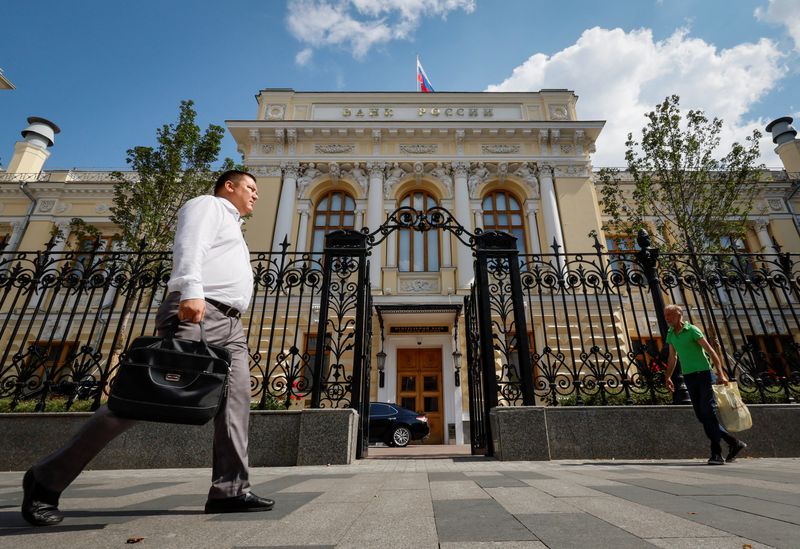By Elena Fabrichnaya and Gleb Bryanski
MOSCOW (Reuters) – The Russian central bank is set to raise its benchmark interest rate by another 200 basis points to 23% at its Dec. 20 board meeting after the rouble’s sharp fall in November, a Reuters poll showed on Tuesday.
The rouble has lost about 15% against the dollar in what many analysts described as panic buying of foreign currency in the wake of new U.S. sanctions on Russian banks including Gazprombank, which handles payments for Russia’s energy trade with Europe.
This is an increase by 100 bps compared to last month’s poll, when analysts projected that the rouble will trade at a median of 100 to the U.S. dollar in one year. A weaker rouble is fuelling inflationary expectations, a major factor in the central bank’s decision.
“We expect that the central bank will raise the key rate by 200 bps to 23% at the Dec. 20 meeting and maintain a firm signal about the possibility of raising the key rate at subsequent meetings,” Sovkombank’s chief analyst Mikhail Vasilyev said.
Ten analysts forecast a December rate hike to 23%, with one predicting a smaller hike to 22% and another a jump to 25%.
The rouble traded at 106 to the dollar on Tuesday and is seen strengthening to a median of 103.2 by the year’s end, according to the average forecast. The rouble is seen stabilising just above 100 to the U.S. dollar throughout next year.
Inflation was seen hitting 9% in 2024, according to the poll, above the central bank’s official estimate of 8.5%, and gradually falling to 6.3% next year as a result of the central bank’s monetary tightening.
“The collapse of the rouble, which the central bank watched from the sidelines for some time, may shift the inflation forecasts for 2025 from 5-5.5% to 6-7%,” said Dmitry Polevoy, head of investment at Astra Asset Management.
He said that more active intervention from the regulator in the forex market could have mitigated the exchange rate situation at an earlier stage.
The central bank stopped foreign currency purchases last week in response to the rouble’s fall but rejected suggestions of more active intervention to prop up the Russian currency, saying it would adhere to the floating exchange rate policy.
Economic growth forecasts were almost unchanged from last month, with analysts expecting GDP growth at 3.8% in 2024, just below the official forecast of 3.9%. Economic growth is expected to slow sharply to 1.8% next year.

